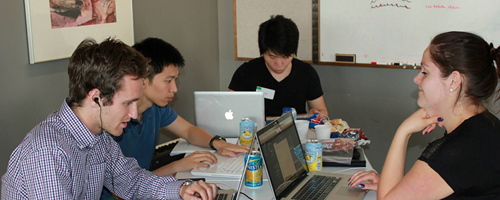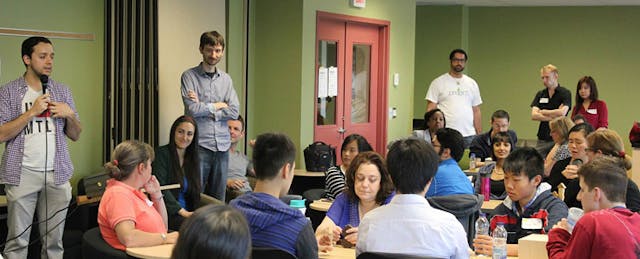Full Disclosure: I participated in EduHack with my team from Prodigy, where we’re building a Pokémon-style math game fully aligned to the CCSS curriculum.
On June 14, eighty-three of Toronto’s most passionate educators and hackers came together at the University of Toronto for the city’s first EduHack, a hackathon focused on building tools to address K-12 problems.
A mix of stakeholders were in attendance. Educators teemed with excitement at the opportunity to works with others to build tools they had envisioned for their classrooms. The usually-sheepish developers were cracking their knuckles at the opportunity to lend a helping hand. And there were even a couple of startups present looking to attract talent and bond over code (and a few drinks).
It was wonderful to see the event reach a broad audience, with an even split between educators and developers and designers, which can be rare at these types of events.
After a brief introduction and word from the sponsors, participants with ideas took the stage for two-minute pitches to the audience to attract educators, students, and precious development talent. Ideas ranged from an activity app to get kids physically active in the classroom to a literacy-tracking solution for charities in third world countries. There was even one verbose teacher-librarian who recited a five-minute poem on the 7 C’s of learning.
Gamification was a hot commodity among the pitched ideas, with educators looking to incorporate badges, rewards, and other engagement mechanisms commonly found in video-games to make their classroom lessons more engaging. Also popular were communication tools to allow teachers to gauge student feedback or engagement, with one team building a simple (yet effective) toolbar for students to ask their teachers questions in class.
My team from Prodigy built bio-sensors for tracking student engagement and frustration levels in the classroom, and reporting it back to the teacher in real-time via a web-interface. We also built an API for a spelling game (designed to be very frustrating for demo purposes), so that third-party game developers or software could plug into the student’s emotional data and adapt to it in real time.
One of the teams, Kapture, hard at work.

Saturday morning started off light with some ice breaker activities, but quickly became more serious as teams got to work and started developing their products. Mentors across a variety of industries and backgrounds, including academics and successful entrepreneurs involved with MaRS (the largest startup hub in Toronto) shuffled around to help the teams plan and execute their ideas. By midnight, only the most serious teams were left in the building as they prepared to present their final prototypes the next day.
The judging started at 1pm on Sunday, with the eleven teams each having 5 minutes to pitch to a panel of judges that included Joseph Wilson, Education Lead at MaRS, and Salar Chagpar, Co-Founder of Prepr Foundation. When the verdicts were in, the top 3 teams were:
- U.Track: Platform designed to put a student’s accountability in their own hands. By allowing students to assess their own learning and reliability (e.g. track attendance) through their online platform, U.Track hopes to reduce the accounting load on teachers and instill a sense of responsibility in the student.
- MindLog: An open student collaboration platform that allows users to highlight and comment on specific sections of a passage or assignment. They say this will be a more efficient collaboration tool than asking your friends questions over Facebook or studying via Google Docs.
- EdCarton: Online resource library where teachers can add, curate and share useful educational tools and software. The team wanted to offer a better way of finding educational tools than sharing a Google Docs spreadsheet, while allowing users to read real feedback from teachers who have used the product.
The winning team, U.Track – (left to right) Eric Rosenberg, Shana Wang, Shelley Chan, Ryan Burwell, Geradoux Sigoue, and Yuki Saito.

The idea for U.Track originated from Eric Rosernberg’s experience as a high school business teacher, who had already started experimenting with a low-tech version of U.Track in his classroom. He saw this event as an opportunity to create a software prototype, after which his team of six will start looking for teachers to pilot the prototype. Within a year, he hopes to have a refined product which he can start selling to schools.
One of the biggest payoffs for organizers Jeff Myers and Mashiyat Shah, both Ph.D students in education and computer science respectively at the University of Toronto, was seeing the energy and enthusiasm of the participants, with many teams planning on taking their prototypes directly into their classrooms. They hope to organize more EduHack events across Canada in the coming years.
My verdict? Anytime you mix educators with real-life problems from the classroom with developers who are eager to help, great things will happen. I expect to see a lot more education-focused hackathons in the near future!


